| ID |
Date |
Author |
Topic |
Subject |
|
2109
|
26 Feb 2021 |
Isaac Labrie Boulay | Bug Report | Undefined client causing issues in transition. |
> Clearly something goes wrong with the STARTABORT transition. Actually from your
> sceenshot, it is not clear why the STARTABORT transition was initiated.
>
> Usually it is called after some client fails the "start run" transition to inform
> other clients that the run did not start after all. (mlogger uses this to close the
> output file, etc).
>
> But in the screenshot, we do not see any client fail the transition (only rootana1
> was called, and it returned "green").
>
> So, a puzzle. One possibility is that the transition code gets so confused
> that it does not record correct transition data to ODB, then the web page
> gets even more confused.
>
> One way to see what happens, is to run the odbedit command "start now -v".
>
> Can you try that? And attach all its output here?
>
> K.O.
Thanks for getting back to me right away. I've attached two screenshots. The first one
is the output after running "start now -v" (everything seemed to work nicely there), the
second output is after using odbedit to stop the run with "stop". Notice that the DAQ
never stops because it gets stuck in between transitions (You can see the run status
being "stopping run" with the cancel transition button).
Thanks.
Isaac |
| Attachment 1: start_now_-v_(1).PNG
|
.PNG.png)
|
| Attachment 2: stop.PNG
|
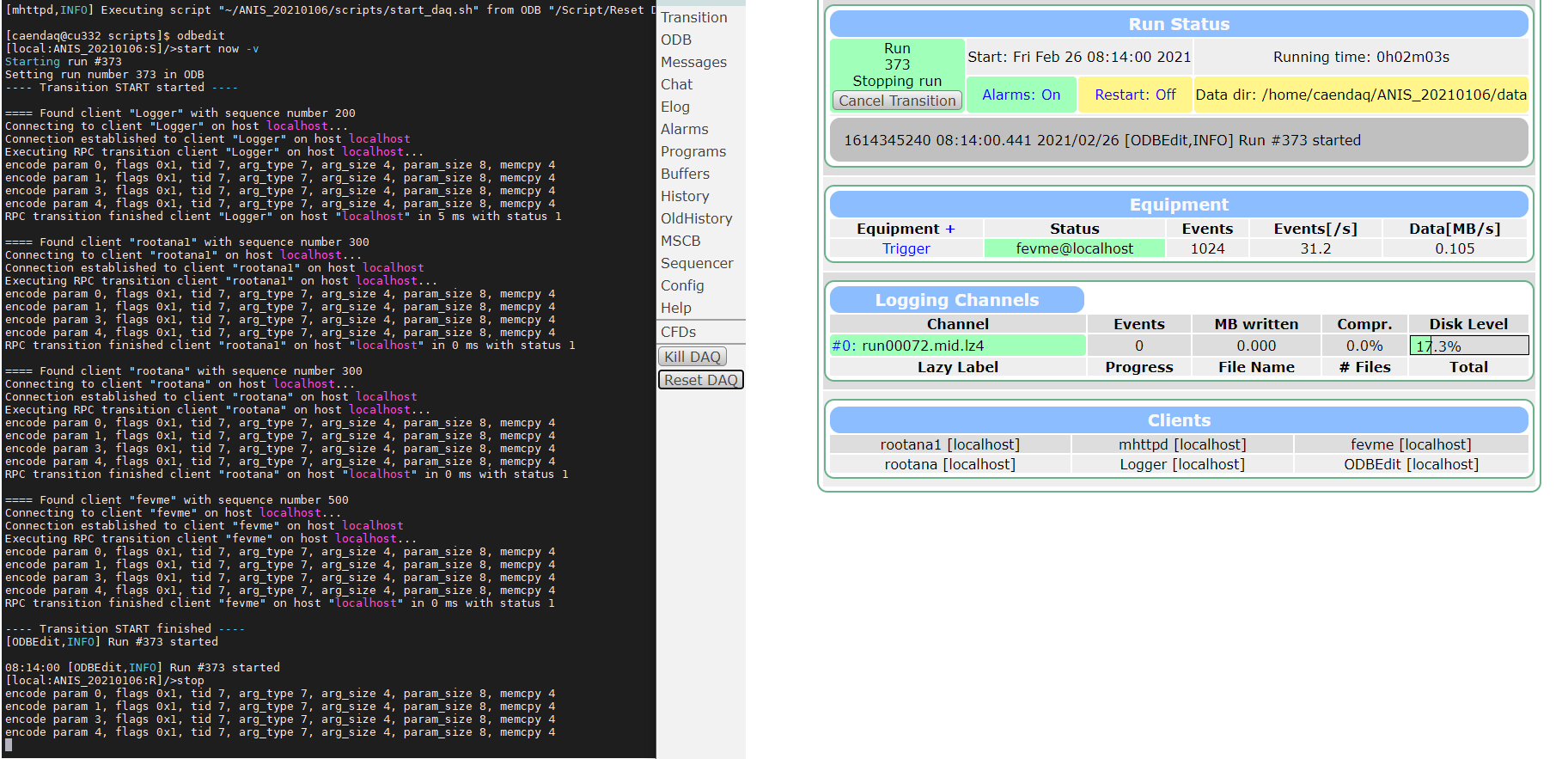
|
|
Draft
|
25 Feb 2021 |
Konstantin Olchanski | Forum | Javascript error during run transitions. |
>
> I have also attached a screen capture of the output.
>
so the error is gone?
> Thanks for your help as always.
>
> Isaac
>
> > K.O.
> >
> >
> > >
> > > Thanks for all the help!
> > >
> > > Isaac
> > >
> > >
> > > 09:24:08.611 2021/02/10 [mhttpd,INFO] Executing script
> > > "~/ANIS_20210106/scripts/start_daq.sh" from ODB "/Script/Start DAQ"
> > >
> > > 09:24:13.833 2021/02/10 [Logger,LOG] Program Logger on host localhost started
> > >
> > > 09:24:28.598 2021/02/10 [fevme,LOG] Program fevme on host localhost started
> > >
> > > 09:24:33.951 2021/02/10 [mhttpd,INFO] Run #234 started
> > >
> > > 09:26:30.970 2021/02/10 [mhttpd,ERROR] [midas.cxx:4260:cm_transition_call,ERROR]
> > > Client "Logger" transition 2 aborted while waiting for client "fevme":
> > > "/Runinfo/Transition in progress" was cleared
> > >
> > > 09:26:31.015 2021/02/10 [mhttpd,ERROR] [midas.cxx:5120:cm_transition,ERROR]
> > > transition STOP aborted: "/Runinfo/Transition in progress" was cleared
> > >
> > > 09:27:27.270 2021/02/10 [mhttpd,ERROR]
> > > [system.cxx:4937:ss_recv_net_command,ERROR] timeout receiving network command
> > > header
> > >
> > > 09:27:27.270 2021/02/10 [mhttpd,ERROR] [midas.cxx:12262:rpc_client_call,ERROR]
> > > call to "fevme" on "localhost" RPC "rc_transition": timeout waiting for reply |
|
2107
|
25 Feb 2021 |
Konstantin Olchanski | Forum | Javascript error during run transitions. |
>
> I have also attached a screen capture of the output.
>
so the error is gone?
K.O. |
|
Draft
|
25 Feb 2021 |
Konstantin Olchanski | Forum | Javascript error during run transitions. |
>
> I have also attached a screen capture of the output.
>
so the error is gone?
K.O. |
|
2105
|
25 Feb 2021 |
Konstantin Olchanski | Forum | m is not defined error |
> I see this mhttpd error starting MSL-script:
> Uncaught (in promise) ReferenceError: m is not defined
> at mhttpd_message (VM2848 mhttpd.js:2304)
> at VM2848 mhttpd.js:2122
your line numbers do not line up with my copy of mhttpd.js. what version of midas
do you run?
please give me the output of odbedit "ver" command (GIT revision, looks like this:
IT revision: Wed Feb 3 11:47:02 2021 -0800 - midas-2020-08-a-84-g78d18b1c on
branch feature/midas-2020-12).
same info is in the midas "help" page (GIT revision).
to decipher the git revision string:
midas-2020-08-a-84-g78d18b1c means:
is commit 78d18b1c
which is 84 commits after git tag midas-2020-08-a
"on branch feature/midas-2020-12" confirms that I have the midas-2020-12 pre-
release version without having to do all the decoding above.
if you also have "-dirty" it means you changed something in the source code
and warranty is voided. (just joking! we can debug even modified midas source
code)
K.O. |
|
2104
|
25 Feb 2021 |
Konstantin Olchanski | Bug Report | Unexpected end-of-file |
> > [mhttpd,ERROR] [history.cxx:97:xread,ERROR] Error: Unexpected end-of-file when
> > reading file "/home/wagasci-ana/Data/online/210219.hst"
I am puzzled. We can try two things:
a) look inside the "bad" hst file, maybe we can see something. run "mhdump -L
/home/wagasci-ana/Data/online/210219.hst". If there is anything wrong with the file, it
will be probably at the end. You can also try to run it without "-L".
b) switch from "midas" history (.hst files) to "FILE" history (mh*.dat files), the
"FILE" history code is newer and the file format is more robust, with luck it may
survive whatever trouble is happening in your experiment. This is controlled in ODB
/Logger/History/XXX/Active (set to "y/n").
c) the output of "mlogger -v" may give us some clue, it usually complains if something
is not right with definitions of history data.
K.O. |
|
2103
|
25 Feb 2021 |
Konstantin Olchanski | Bug Report | Undefined client causing issues in transition. |
Clearly something goes wrong with the STARTABORT transition. Actually from your
sceenshot, it is not clear why the STARTABORT transition was initiated.
Usually it is called after some client fails the "start run" transition to inform
other clients that the run did not start after all. (mlogger uses this to close the
output file, etc).
But in the screenshot, we do not see any client fail the transition (only rootana1
was called, and it returned "green").
So, a puzzle. One possibility is that the transition code gets so confused
that it does not record correct transition data to ODB, then the web page
gets even more confused.
One way to see what happens, is to run the odbedit command "start now -v".
Can you try that? And attach all it's output here?
K.O. |
|
2102
|
25 Feb 2021 |
Konstantin Olchanski | Forum | TMFePollHandlerInterface timing |
> Am I right in thinking that the TMFE HandlePoll function is calle once per
> PollMidas()? And what is the difference to HandleRead()?
Actually, polled equipment is not implemented yet in TMFE, as you noted, the
internal scheduler needs to be reworked.
Anyhow, I think with modern c++ and with threads, both "periodic" and "polled"
equipments are not strictly necessary.
Periodic equipment is effectively this:
in a thread:
while (1) {
do stuff, read data, send events
sleep
}
Polled equipment is effectively this:
in a thread:
while (1) {
if (poll()) { read data, send events }
else { sleep for a little bit }
}
Example of such code is the "bulk" equipment in progs/fetest.cxx.
But to implement the same in a single threaded environment (eliminates
problems with data locking, race conditions, etc) and to provide additional
structure to the user code, the plan is to implement polled equipment in TMFE
frontends. (periodic equipment is already implemented).
K.O. |
|
2101
|
25 Feb 2021 |
Konstantin Olchanski | Bug Report | tmfe_main.cxx missing include <signal.h> |
> The most recent commit (b43aef648c2f8a7e710a327d0b322751ae44afea) throws this
> compiler error:
> src/tmfe_main.cxx:39:11: error: 'SIGPIPE' was not declared in this scope
> signal(SIGPIPE, SIG_IGN);
>
> It's fixed by adding #include <signal.h> to that file.
"but it works just fine on my mac!"
anyhow, thank you for reporting this problem, it already fixed. the bitbucket auto-
build also caught it. I also boogered up "make remoteonly", also fixed now.
BTW, for production use I recommend midas from the "release" branches, unless one
needs a bug fix or new feature from the development branch.
K.O. |
|
2100
|
25 Feb 2021 |
Lars Martin | Forum | TMFePollHandlerInterface timing |
Am I right in thinking that the TMFE HandlePoll function is calle once per
PollMidas()? And what is the difference to HandleRead()? |
|
2099
|
25 Feb 2021 |
Lars Martin | Bug Report | tmfe_main.cxx missing include <signal.h> |
The most recent commit (b43aef648c2f8a7e710a327d0b322751ae44afea) throws this
compiler error:
src/tmfe_main.cxx:39:11: error: 'SIGPIPE' was not declared in this scope
signal(SIGPIPE, SIG_IGN);
It's fixed by adding #include <signal.h> to that file. |
|
2098
|
25 Feb 2021 |
Isaac Labrie Boulay | Bug Report | Undefined client causing issues in transition. |
Hi all,
I'm currently experiencing an issue during run transitions. It comes in the form
of an alert saying "TypeError: Cannot read property 'length' of undefined"
whenever I'm in the "transition" window on mhttpd. I have attached an image of
what the transition window looks like when this happens.
By the looks of it and by peering at the lines in transition.html where the
error occurs, it's pretty obvious that there is some strange undefined client
that the web page tries to access.
I don't know how to find what this client is. Is there a way to see it in the
ODB?
The issues happens in show_client() of transition.html (called by callback()).
Here's the trace:
Uncaught (in promise) TypeError: Cannot read property 'length' of undefined
at show_client (?cmd=Transition:227)
at callback (?cmd=Transition:420)
at ?cmd=Transition:430
Any help would be very appreciated!
Thanks so much.
Isaac |
| Attachment 1: error_message.PNG
|
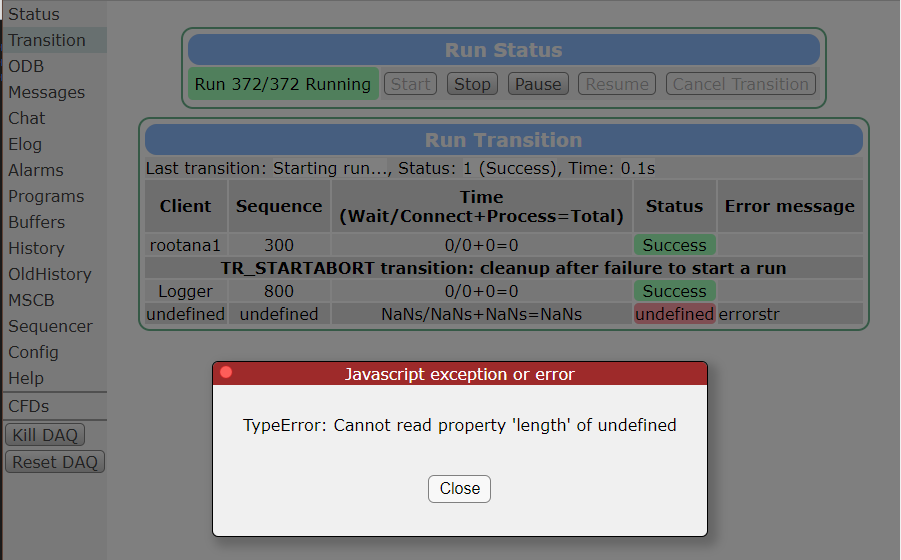
|
| Attachment 2: undefined_client.PNG
|
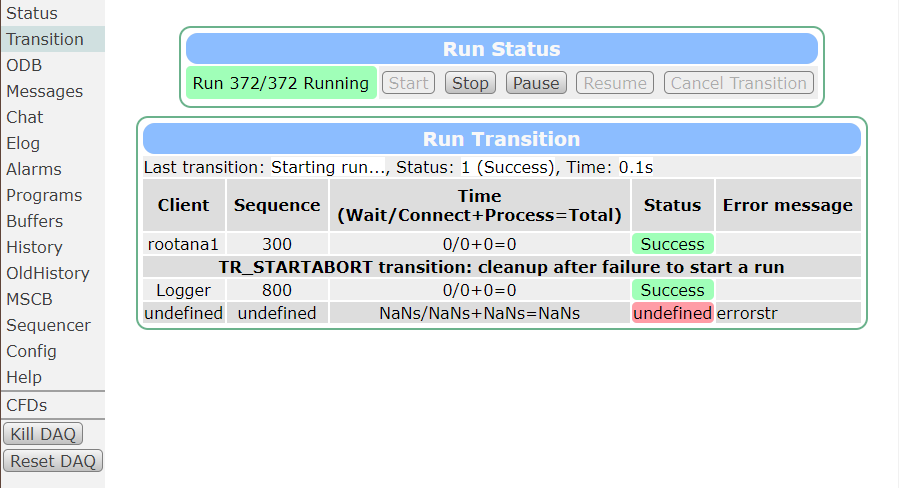
|
|
2097
|
25 Feb 2021 |
Stefan Ritt | Bug Report | history reload |
I have to reproduce the problem. Can you please send me the full link by direct email. As you know, I'm also at PSI.
Stefan |
|
2096
|
24 Feb 2021 |
Zaher Salman | Bug Report | history reload |
I have a history that is embedded in a custom page using
<div class="mjshistory" data-group="SampleCryo" data-panel="SampleTemp" data-scale="30m" style="'+size+' position: relative;left: 640px;top: -205px;"></div>
this works fine when I load the page but seems to cause a timeout when reloading (F5) the page. It used to work fine last year but since a midas update this year it does not work.
When I manually stop the script when firefox reports that it is slowing down the browse I get the following in the console:
Script terminated by timeout at:
binarySearch@http://xxx.psi.ch:8081/mhistory.js:1051:11
MhistoryGraph.prototype.findMinMax@http://xxx.psi.ch:8081/mhistory.js:1583:28
MhistoryGraph.prototype.loadInitialData/<@http://xxx.psi.ch:8081/mhistory.js:780:15
any ideas what may be causing this?
thanks.
Another hint to the problem, the custom page is accessible via
http://xxx.psi.ch:8081/?cmd=custom&page=SampleCryo&
once loaded the address changes to where A and B change values as time passes (I guess B-A=30m).
http://xxx.psi.ch:8081/?cmd=custom&page=SampleCryo&&A=1614173369&B=1614175169 |
|
2095
|
18 Feb 2021 |
Pintaudi Giorgio | Bug Report | Unexpected end-of-file |
It appears that the issue is trigger by a nonexisting Event and Variable as shown
in the attached picture. This issue can arise when restoring the ODB from a
previous version or importing ODB values from other MIDAS instances.
It might be useful if the error message were more clear about the source of the
problem.
> Hello!
> Sometimes when I mess around with the history plots I get the following error:
>
> [mhttpd,ERROR] [history.cxx:97:xread,ERROR] Error: Unexpected end-of-file when
> reading file "/home/wagasci-ana/Data/online/210219.hst"
>
> I have tried the following without success:
>
> - Remove the MIDAS history files
> - Restart mhttpd and mlogger
>
> I do not know what triggers the error but when it triggers the above message is
> printed hundres of times a second, completely spamming the message log.
>
> It happened again today after I set the label of a frontend too long making
> mlogger crash. After fixing the label length, the above message appeared and it
> does not seem to go away. |
| Attachment 1: Screenshot_from_2021-02-19_15-41-23.png
|
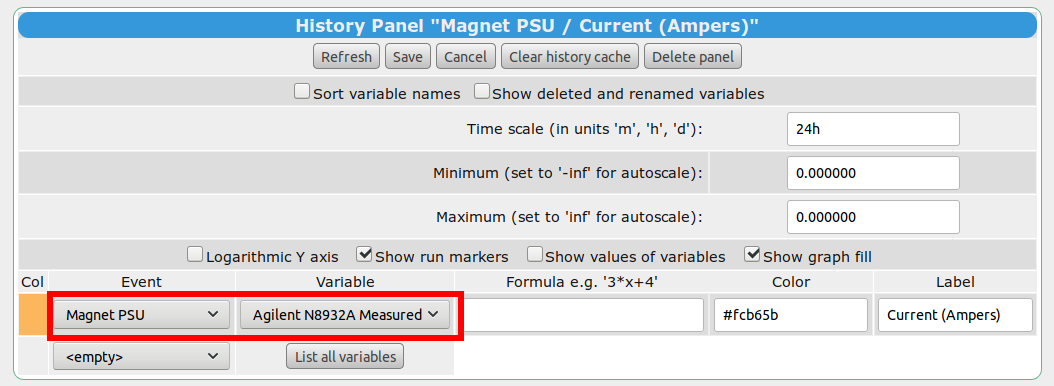
|
|
2094
|
18 Feb 2021 |
Pintaudi Giorgio | Bug Report | Unexpected end-of-file |
Hello!
Sometimes when I mess around with the history plots I get the following error:
[mhttpd,ERROR] [history.cxx:97:xread,ERROR] Error: Unexpected end-of-file when
reading file "/home/wagasci-ana/Data/online/210219.hst"
I have tried the following without success:
- Remove the MIDAS history files
- Restart mhttpd and mlogger
I do not know what triggers the error but when it triggers the above message is
printed hundres of times a second, completely spamming the message log.
It happened again today after I set the label of a frontend too long making
mlogger crash. After fixing the label length, the above message appeared and it
does not seem to go away. |
|
2092
|
16 Feb 2021 |
Ruslan Podviianiuk | Forum | m is not defined error |
Hello,
I see this mhttpd error starting MSL-script:
Uncaught (in promise) ReferenceError: m is not defined
at mhttpd_message (VM2848 mhttpd.js:2304)
at VM2848 mhttpd.js:2122
As I can see it does not affect work of MSL script but shows ReferenceError in
Midas sequencer (see picture).
Could please point me how to fix this error?
Thanks.
Ruslan |
| Attachment 1: m_is_not_defined.png
|
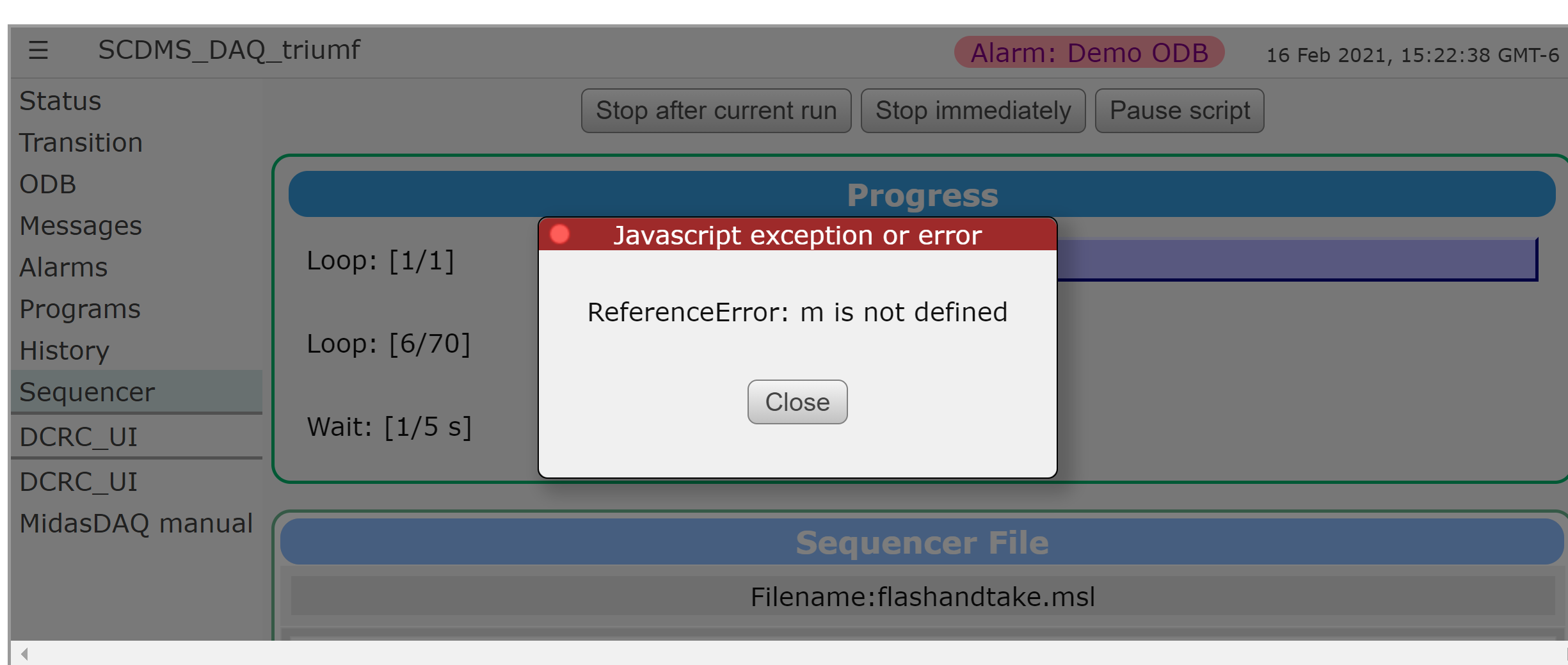
|
|
2091
|
12 Feb 2021 |
Konstantin Olchanski | Bug Report | mlogger history snafu |
there is a problem with mlogger between commits xxx (17 Nov 2020) and a762bb8 (12 feb 2021). because of
confusion between seconds and milliseconds, FILE (mhf*.dat files) and SQL history are recording with
incorrect timestamps.
- traditional MIDAS history (*.hst files) does not have this problem (because of a buglet)
- midas-2020-12 release does not have this problem (it has mlogger from midas-2020-08 release)
there are some additional changes in mlogger that we are sorting out, when ready, we will make a new
release of midas.
K.O. |
|
2090
|
11 Feb 2021 |
Isaac Labrie Boulay | Forum | Javascript error during run transitions. |
> > I am encountering a Javascript error (TypeError: client.error is undefined) when
> > I transition between run states. Does anybody have an idea of what my problem
> > might be? I have pasted an example of what MIDAS logs during such sequences.
>
>
> Not enough information. Can you do this:
>
> a) for the javascript error, if you get it every time, open the javascript debugger
> and capture the stack trace? or at least the file name, function name and line number
> where the javascript exception is thrown?
I've attached a screenshot of the call stack showing the file names and line numbers.
> b) for the run start failure, start the run from odbedit "start now -v" or from
> "mtransition -v -d 1 START" (or "stop" as the case may be). capture the output, email
> to me directly or put in this elog here.
I have also attached a screen capture of the output.
Thanks for your help as always.
Isaac
> K.O.
>
>
> >
> > Thanks for all the help!
> >
> > Isaac
> >
> >
> > 09:24:08.611 2021/02/10 [mhttpd,INFO] Executing script
> > "~/ANIS_20210106/scripts/start_daq.sh" from ODB "/Script/Start DAQ"
> >
> > 09:24:13.833 2021/02/10 [Logger,LOG] Program Logger on host localhost started
> >
> > 09:24:28.598 2021/02/10 [fevme,LOG] Program fevme on host localhost started
> >
> > 09:24:33.951 2021/02/10 [mhttpd,INFO] Run #234 started
> >
> > 09:26:30.970 2021/02/10 [mhttpd,ERROR] [midas.cxx:4260:cm_transition_call,ERROR]
> > Client "Logger" transition 2 aborted while waiting for client "fevme":
> > "/Runinfo/Transition in progress" was cleared
> >
> > 09:26:31.015 2021/02/10 [mhttpd,ERROR] [midas.cxx:5120:cm_transition,ERROR]
> > transition STOP aborted: "/Runinfo/Transition in progress" was cleared
> >
> > 09:27:27.270 2021/02/10 [mhttpd,ERROR]
> > [system.cxx:4937:ss_recv_net_command,ERROR] timeout receiving network command
> > header
> >
> > 09:27:27.270 2021/02/10 [mhttpd,ERROR] [midas.cxx:12262:rpc_client_call,ERROR]
> > call to "fevme" on "localhost" RPC "rc_transition": timeout waiting for reply |
| Attachment 1: start_now_-v.PNG
|
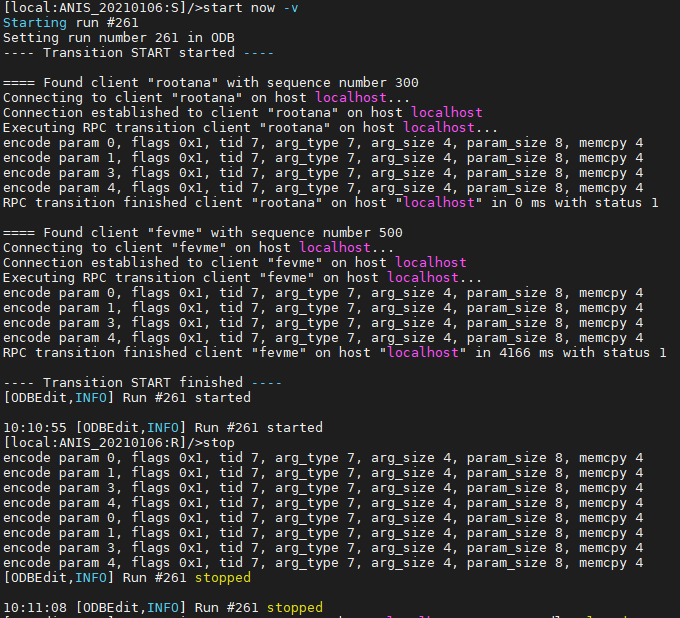
|
| Attachment 2: Call_Stack_for_JavaScript_Error.PNG
|

|
|
2089
|
10 Feb 2021 |
Konstantin Olchanski | Release | midas-2020-12-a |
midas-2020-12-a is here, see https://midas.triumf.ca/MidasWiki/index.php/Changelog#2020-12
notable change from previous midas releases:
Use of ODB "Common" by mfe.c frontends has changed. New preferred behaviour
is to have the values defined in the equipment structure in the source code
to always overwrite values in ODB /Equipment/Foo/Common, except for the value
of "Common/enabled" (equipment_common_overwrite set to TRUE).
All mfe.c frontends will need to be modified for this change:
- for old behaviour (use ODB "Common"), add: BOOL equipment_common_overwrite = false;
- for new behaviour (use equipment values in the source code), add: BOOL equipment_common_overwrite = true;
The TMFE C++ frontend does not implement this change yet, it uses all "Common" values from ODB
and there is no way to overwrite things like the MIDAS event buffer name from C++ code. This may
change with the next version.
notable updates since midas-2020-08:
- new ODB variable /Experiment/Enable sound can be used to globally prevent mhttpd from playing sounds.
- Lazylogger now supports writing data over SFTP.
- odbvalue elements on custom pages now support an onload() callback as well as onchange(). Most elements now also
support a data-validate callback.
- custom pages can now tie a select drop-down box to an ODB value using modbselect.
- ability to choose whether the code or the current ODB values take precendence for the "Common" settings of an
equipment when starting a frontend. See elog thread 2014 for more details, and the "Upgrade guide" below for
instructions.
- minor improvements to mdump program - support for 64-bit data types and ability to load larger events if needed.
- minor improvements to History plots and Buffers webpage.
- bug fixes
plans for next development: major update of mlogger to simplify channel
configuration in odb, improvements to mhttpd multithreading, new history plot
configuration page, more c++ification.
To obtain this release, either checkout the top of branch release/midas-2020-12
(recommended) or checkout the tag midas-2020-12-a.
K.O. |